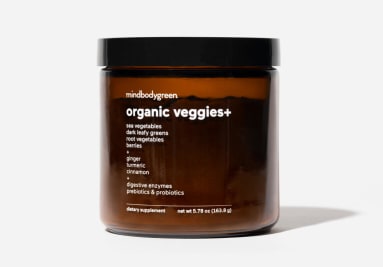7 Surprising Health Benefits Of Chlorella: A Nutrient-Rich Sea Vegetable


Getting your veggies in for the day is undeniably one of the essential parts of a well-balanced diet, but your body could benefit from eating more than just the basic produce found in your local grocery store.
In fact, sea vegetables have garnered some popularity in recent years for their vitamin and mineral content, but outside of some better-known varietals like algae and seaweed, these unique veggies don't often get the spotlight.
One of these underrated sea vegetables is chlorella. Found in freshwater, this ingredient is a variation of green algae that is packed with antioxidants and an array of benefits for the body. "Chlorella contains 10% chlorophyll, 50% protein, minerals (like calcium and iron), and essential fatty acids," explains Megan Fahey, M.S., R.D., IFNCP.
Here's everything you need to know about this nutrient-dense sea vegetable, down to the wide-ranging benefits and best way to add it to your diet.
Benefits of chlorella:
It's rich in vitamins and minerals.
Antioxidants help combat free-radical-driven oxidative stress, and chlorella is rich in antioxidant vitamins and minerals. "Chlorella, with its bright green color, is a source of antioxidants including vitamin K, vitamin C, and phytochemicals such as lutein," explains Julie Stefanski, RDN, registered dietitian and spokesperson for the Academy of Nutrition & Dietetics.
But that's just the beginning. Chlorella is also loaded with B vitamins, which can often be difficult to get on a plant-based diet. "It also has high mineral content in iron, calcium, potassium, and magnesium, and low levels of copper and zinc," adds Leah Johansen, M.D., staff physician at Lifeforce.
It has anti-inflammatory properties.
"For our bodies, [chlorella] works via modulation of TNF-alpha, IL-1 beta, and COX-2," explains Johansen. In layman's terms, this vegetable has anti-inflammatory properties that can help balance our inflammatory response, which is critical for things like immune resilience, cardiometabolic health, and more.*
It's a source of plant-based protein.
When you think of plant-based protein, it's likely your mind goes to beans and soy products, but chlorella and other sea vegetables (depending on the source and how much you eat per serving) can actually offer some of this important macronutrient, too.
"Chlorella is frequently promoted as a vegan source of protein, but it's important to look at the quantity of protein you'll receive from a supplement," notes Stefanski. Keep in mind that you should be aiming for about 0.36 gram of protein per pound of body weight each day.
It can support your immune system.
"This microalgae containing alpha-glucans, similar to beta-glucans found in mushroom species, has immune-modulating effects,"* notes Johansen.
Although more studies are needed to definitively state the full effectiveness of chlorella on immune health, one smaller study1 revealed that after an eight-week period of consuming just 5 grams of this vegetable, participants showed higher markers of immune activity.*
It can help you naturally detox.
Contrary to popular belief within diet culture, a healthy body is actually perfectly capable of detoxing itself without the help of juices and temporary cleanses, and chlorella is a natural ingredient that may help the process along as it binds to heavy metals within the body.*
That being said, it's because chlorella binds to these heavy metals that the ingredient may have a more significant impact on the environment. "Chlorella's ability to bind to heavy metals makes it a possible source of environmental contaminants, so it's important to choose a reputable company which controls the sourcing of the algae and manufacturing process," warns Stefanski. The organic variety of chlorella is also recommended to ensure a high-quality ingredient source.
It can promote longevity.
A buzzy word in the health space, longevity indicates a longer duration of life. As there are multiple forms of chlorella, "some species contain significant amounts of astaxanthin, the red pigment in the carotenoids found in algae and pink-red color in salmon," explains Johansen. This is unique because astaxanthin is an antioxidant that has been shown to support longevity2.
How to get more chlorella.
Chlorella often comes in a powder or capsule form, but it is worth noting that because this plant has a hard cell wall, it cannot be ingested whole and instead must be included in a powder or supplement form to make it more bioavailable to the body.
Thankfully, the powder variation of organic chlorella (as seen in mbg's organic veggies+) is easy to mix into smoothies, pesto recipes, and even pancakes to enhance your cooking and array of nutritional inputs without affecting the flavor of your meals.
The takeaway.
Nutrient dense and often regarded as a superfood, chlorella is one sea vegetable you may want to consider adding to your diet in powder form. Not only will it offer the body a natural boost of nutrients and immune support, but it can also help bolster your overall well-being.*

Merrell Readman is the Associate Food & Health Editor at mindbodygreen. Readman is a Fordham University graduate with a degree in journalism and a minor in film and television. She has covered beauty, health, and well-being throughout her editorial career, and formerly worked at SheFinds. Her byline has also appeared in Women’s Health. In her current role, she writes and edits for the health, movement, and food sections of mindbodygreen. Readman currently lives in New York City.

